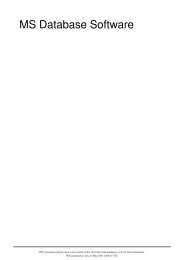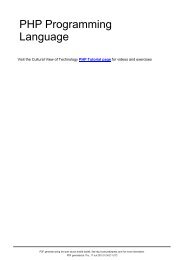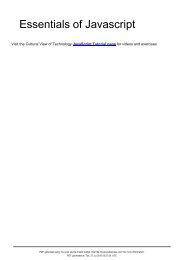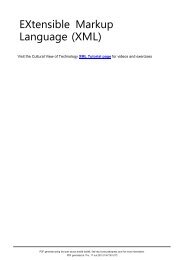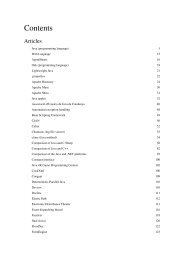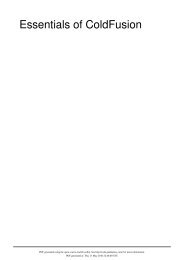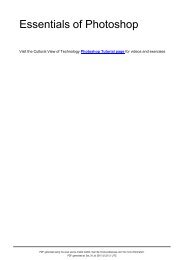Structured Query Language (SQL) - Cultural View of Technology
Structured Query Language (SQL) - Cultural View of Technology
Structured Query Language (SQL) - Cultural View of Technology
Create successful ePaper yourself
Turn your PDF publications into a flip-book with our unique Google optimized e-Paper software.
PL/<strong>SQL</strong> 76<br />
BEGIN<br />
[Exception<br />
END;<br />
[declaration block]<br />
<br />
PIPE ROW ;<br />
RETURN;<br />
exception block]<br />
PIPE ROW ;<br />
RETURN;<br />
There are three types <strong>of</strong> parameter: IN, OUT and IN OUT. An IN parameter is used as input only. An IN parameter<br />
is passed by reference and thus cannot be changed by the called program. An OUT parameter is initially NULL. The<br />
program assigns the parameter a value and that value is returned to the calling program. An IN OUT parameter may<br />
or may not have an initial value. That initial value may or may not be modified by the called program. Any changes<br />
made to the parameter are returned to the calling program by default by copying but, with the NOCOPY hint may be<br />
passed by reference.<br />
Procedures<br />
Procedures are similar to Functions, in that they can be executed to perform work. The primary difference is that<br />
procedures cannot be used in a <strong>SQL</strong> statement and although they can have multiple out parameters they do not<br />
"RETURN" a value.<br />
Procedures are traditionally the workhorse <strong>of</strong> the coding world and functions are traditionally the smaller, more<br />
specific pieces <strong>of</strong> code. PL/<strong>SQL</strong> maintains many <strong>of</strong> the distinctions between functions and procedures found in many<br />
general-purpose programming languages, but in addition, functions can be called from <strong>SQL</strong>, while procedures<br />
cannot.<br />
Packages<br />
Packages are groups <strong>of</strong> conceptually linked Functions, Procedures,Variable,PL/<strong>SQL</strong> table and record TYPE<br />
statements,Constants & Cursors etc. The use <strong>of</strong> packages promotes re-use <strong>of</strong> code. Packages usually have two parts,<br />
a specification and a body, although sometimes the body is unnecessary. The specification (spec for short) is the<br />
interface to your applications; it declares the types, variables, constants, exceptions, cursors, and subprograms<br />
available for use. The body fully defines cursors and subprograms, and so implements the spec. They are stored<br />
permanently in USER_SOURCE system table. Advantages 1.Modular approach, Encapsulation/hiding <strong>of</strong> business<br />
logic, security, performance improvement, re-usability.They support OOPS features like function over<br />
loading,encapsulation. 2.Using we can declare session level (scoped) variables. Since variable declared in pack spec<br />
has session scope.<br />
Variables<br />
Numeric variables<br />
variable_name number(P[,S]) := value;<br />
To define a numeric variable, the programmer appends the variable type NUMBER to the name definition. To<br />
specify the (optional) precision(P) and the (optional) scale (S), one can further append these in round brackets,<br />
separated by a comma. ("Precision" in this context refers to the number <strong>of</strong> digits which the variable can hold, "scale"<br />
refers to the number <strong>of</strong> digits which can follow the decimal point.)



